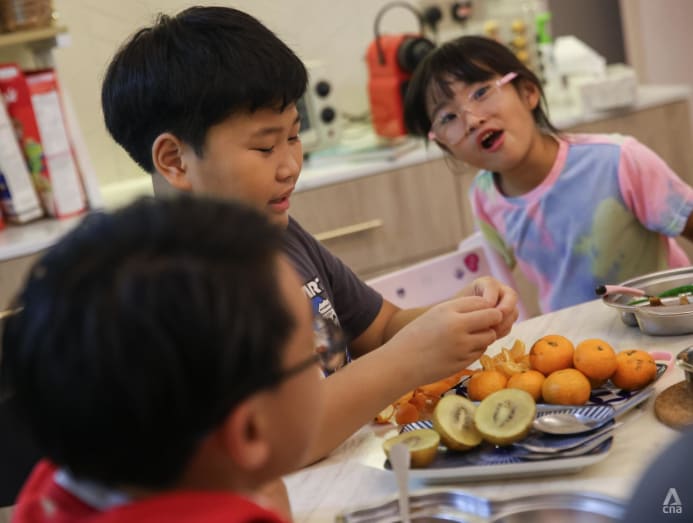My children were shown kindness and empathy in school. This was what happened after that
Everyone wants to succeed in life, or at least to come up near the top of the ladder. Mum-of-five Kelly Ang knows this, but it is important to her that her children do not step on others on their way up in future.

The more you practise kindness, the more naturally it comes, Ms Kelly Ang says, hoping that this applies to her children. (Illustration: CNA/ Samuel Woo, iStock)

This audio is generated by an AI tool.
When I first became a parent, I was determined to raise my children to be kind, considerate and empathetic.
“Why can’t I?” I thought. Kindness doesn’t have to come at the cost of success.
Five kids and 12 years later, I still often find myself grappling with this.
Three of my children are in primary school now, with my oldest gearing up for the Primary School Leaving Examination later this year.
They’re starting to experience first-hand the realities of a world in which they’re constantly benchmarked against their peers.
A world in which we can’t help but look left, right, front and back, making endless comparisons to others in order to ascertain our own position and identity.
As their mother, I feel myself right in the thick of it, having to make conscious decisions every day to choose words and actions that reflect the values I hope will eventually become core to their characters.
In the process, I have had to ask if I have been proven wrong in my idealistic aspirations.
WHAT IS SUCCESS?
Everyone creates their own version of success, but while everyone’s definition may differ in their specifics, the typical pathway in Singapore may look like this:
- Achieving good grades
- Getting into “branded” schools
- Being placed in national competitions for sports or other activities
- Getting employed in a high-paying or socially prestigious job
This "norm" above seems largely unchanged in practice today, no matter what our government ministers and leaders have been saying in the past few years about embracing alternative pathways to success.
Right now, my children see recognition for their hard work in school and their co-curricular activities as the main marker of their success.
Good grades mean a lot to them at this age. And so does winning football matches to obtain a higher ranking in the league table or being awarded medals for their arts performances.

The truth is that this definition of success, long entrenched in Singapore’s history and national identity, is a hard one to dispel.
Even at a young age, children can observe that society glorifies those leading the pack in certain ways – those who are smarter, louder, more talented or simply being fortunate enough to come from a more financially well-off family.
At school, sports teams and performing arts clubs select the best students and put them through rigorous training programmes.
Those deemed “not good enough” are dropped or left to languish, with little pathways for growth.
Students who do well in their academic studies are given opportunities to learn more at advanced levels or take part in competitions.
As much as we tell our children the results of any test, sports trial, audition or competition don’t matter, they absolutely, undeniably do.
Seeing this played out repeatedly in school – the place where they spend the bulk of their fundamental development years – how can our children grow up to believe otherwise?
CAN ONE BE KIND IN PURSUIT OF SUCCESS?
No one says it is impossible to be kind as we pursue success.
All the same, the reality is that in the struggle to climb the ladder of life, kindness is often sacrificed as “dead weight”.
In a 2014 study by the Harvard Graduate School of Education in the United States, 81 per cent of parents said that they prioritised their children’s achievements and happiness over their ability to care for others.
Everyone wants to win – or at least to come up near the top of the ladder.
Surely it cannot be all that bad if you happen to step on someone on your way up. Whatever gets you there, right?
Irony aside, perhaps this is the more pertinent question: As my children chase their ideals of success, are they also learning and striving to be kind and compassionate at the same time?
When my daughter first started dancing competitively at age five, she struggled at every class.
Her teachers and seniors took the time to show her the steps slowly, encouraged her when she showed progress and cheered her on wholeheartedly when she finally got it.
Two years in, she is now decent enough to perform a solo dance at the upcoming competitions.

Earlier this year, one of my sons decided to run for a position in school.
A good friend of his was also running for the same position, but decided to give his vote to my son instead of himself.
Neither of them won the top place – but both boys got voted into the deputy positions together.
I was exceedingly glad for this, because it taught my son two valuable lessons: Success can come to you even when you don’t put yourself first, and it can be shared.
At this point, you may be wondering: “It sounds like your kids haven’t truly been ‘successful’ when it comes to winning. Isn’t this more like an attempt at consolation?”
Here’s my answer.
My daughter now extends the same grace and kindness she received to the new girls in her dance troupe.
She goes out of her way to show them the steps when they’re unsure, encourages them not to give up and cheers them on excitedly when they finally get it.
Watching her, I can’t help but feel proud – perhaps even more so than when her troupe clinched third place in their last competition.
She now understands that even when the stakes are high, you can absolutely be patient and look out for others and still do well.
My son tells me that he’s really looking forward to an exciting year of shared responsibilities with his friend. To him, the road ahead already seems more meaningful with his buddy by his side.
In 10 or 20 years, my children probably won’t remember who came in first, second or third at this or that competition, or who got the top spot in this or that committee.
They will, however, remember the lessons they’ve learnt. These will stay with them for life, far longer than any grade or medal.
KINDNESS STARTS AT HOME
In a survey last year by the Singapore Kindness Movement, one in four young Singaporeans (aged 15 to 24) said that they hold back from showing kindness in public because they are afraid of being embarrassed.
I believe, though, that kindness is like a muscle. The more you practise it, the more naturally it comes.
And the best place to do so is at home, where we feel comfortable making mistakes without fear of judgment.
So we do our best to teach our children to be considerate of each other.
When their baby sister is down for a nap, we remind the older ones to keep the noise level down.
While the older children are studying, we nudge their younger siblings to play in a different room.
After family meals, everyone helps to clean up, whether we’re dining out or at home.
Most days, the older children pitch in to prepare fruits and desserts for the younger ones.

Long car rides can be a trial for any family with young children, let alone five.
For such trips, we’ve painstakingly taught our kids to peaceably share packed snacks among themselves, with the less hungry ones willing to take less so that the hungrier ones may have a little more.
When playing board games or video games as a family, we remind the older children to be patient with their younger siblings, who are still familiarising themselves with rules and gameplay.
It doesn’t hurt that when the younger ones finally get the hang of it, they always repay the favour by teaming up with their older sibling against the rest of the family to help them win.
Our households are full of opportunities to practise kindness in the form of putting the needs of our families ahead of our own. How else can our children learn to be kind to strangers outside the home?
Note that the key word here is “practise”, because this is very much a work in progress.
My husband and I also make it a point to praise our children not just for winning competitions and attaining good grades, but most often for showing care for each other and their friends.
“Mum and Dad are very proud of you for choosing to be kind", is what we would say.
We all want our kids to grow into the best versions of themselves. More than being rich or famous or powerful, I will count myself “successful” as a parent to have raised adults who are kind.
Kelly Ang is a mother of five and a freelance writer.













